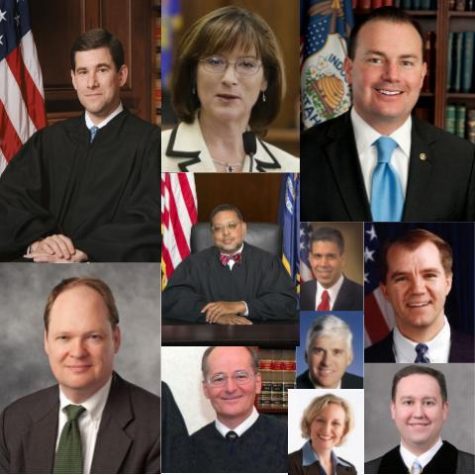Opinion: Trump’s Supreme Court Nominees, Ranked
January 17, 2017
Donald Trump currently has a list of 21 people who he has said are the only possible nominees to the Supreme Court. Many of them are capable and qualified conservative justices in U.S. courts, but many also resemble his picks for the presidential cabinet–politicians that are so racist, xenophobic, anti-environment, pro-gun, or homophobic that they could only be nominated by Trump (or his team). Here is a list of the 21 possible justices, ordered from the most moderate, predictable, and qualified prospective nominees, to the most blatantly incompetent and blindly hateful nominees.
- Federico Moreno is a ‘Venezuelan-born’ (not ‘Venezuelan-American’) judge who serves on the US District Court for the Southern District of Florida, and has worked as a public defender for Florida courts in the past as well. He served on one case where 15 Cuban immigrants were returned after being found under a bridge in the Florida Keys that was “not U.S. territory” because it was “rooted underwater.” Moreno defended the immigrants, saying that the government should not have returned them and must make its “best efforts to help the immigrants return to the United States.”
- Robert Young, as Supreme Justice of the Michigan Supreme Court is the highest black elected official serving in the state of Michigan. He was endorsed by Michigan Right to Life and the Shooters Alliance for Firearm Rights during his election to the Michigan Supreme Court.
- Amul Thapar has a “federalist judicial outlook,” which is usually associated with Republican political affiliations. A popular opinion he published was on a case in which women were being charged for fraud after persuading men to buy them drinks and then leaving the bar. He dismissed the case, saying the men got what they bargained for, “the opportunity to buy a young woman a drink.”
- Don Willett, like Trump, has a popular twitter for a conservative politician. When named on this list, people were surprised because he has frequently tweeted things that poke fun at Donald Trump himself, such as this one.
 He was endorsed in his last election by the executive director of Gun Owners of America.
He was endorsed in his last election by the executive director of Gun Owners of America. - Joan L. Larsen has been criticized by pro-life voters as a feminist lawmaker who wants to fight sexism in law. They are disturbed that she has mentioned the sexism in Roe v. Wade many times without criticizing the case. Is likely to be pro-life because she clerked for ‘pro-life hero’ Justice Scalia.
- David Stras, like Larsen, has been criticized by pro-life voters because he hasn’t said that he will work as a judge to make abortion illegal. He has published books about how the role of a judge is not to insert their opinion into a case, and that the recent appointments of judges have been too politicized.
- Thomas Hardiman supported people being allowed to carry guns in public without demonstrated need. He has managed to stay out of controversial cases for most of his career, but is likely chosen on this list because he has spoken at Federalist Society events many times, a conservative group that Trump’s team relied on heavily to make this list.
- Margaret A. Ryan is a former Marine, and has previously clerked for conservative Justice Clarence Thomas. She has ruled on many military cases, but not many hot topic issues such as abortion or gun control, so the only clue to her conservatism is her work in the past.
- Neil Gorsuch has been praised by Republicans for his conservatism. He has a book published about euthanasia where he states “human life is intrinsically valuable” and that “intentional killing is always wrong,” and is known to be very pro-life.
- Allison Eid serves as a justice on the Colorado Supreme Court, where she has written opinions in support of allowing concealed weapons on college campuses. She worked for the pro-life Supreme Court Justice Clarence Thomas, and wrote speeches for Reagan’s pro-life Education Secretary. While a justice on the Colorado Supreme Court, she ruled that it was unconstitutional for the University of Colorado to have a no-guns-on-campus policy.
- Raymond Kethledge is popular among conservatives due to several things he’s done as a member of the 6th Circuit US Court of Appeals. One opinion he wrote about a case where Kaplan was being sued for employment discrimination was named by the Wall Street Journal’s conservative editorial board the Opinion of The Year in 2014. In 2008 he sided with the Ohio Republican Party to sue and potentially prevent as many as 200,000 registered voters from having their ballot counted, which was then shot down unanimously by the Supreme Court.
- Thomas Lee is less pro-second amendment than his brother, Mike Lee, who also made it to Trump’s prospective nominee list. He joined a ruling that said gun owners could be held responsible if negligence of their firearm resulted in the death of someone. He said that an unborn fetus is a “child” under Utah’s wrongful death statute. He, or his brother, would be the first Mormons to serve as Supreme Court justices.
- Keith Blackwell has been unclear about his stance on gun control by ruling to limit gun licenses but then releasing opinions in support of making them (carry licenses) accessible to convicted felons.
- Timothy Tymkovich passed a ballot initiative attempting to ban legislation against discrimination towards LGBT people. The Supreme Court then ruled against him. He also carved a huge hole in the Affordable Care Act by ruling that forcing a company to provide contraceptive health care to their employees receiving health care violated that company’s right of religious freedom.
- Edward Mansfield was appointed to the Iowa Supreme Court after three justices were voted off for voting to legalize gay marriage. He judged a case in which a dentist fired his dental hygienist in order to save his marriage, after telling her to wear less revealing clothing to the office so that he wouldn’t be attracted to her. The dentist said her standard for what was too revealing should be “if she saw his pants bulging.” Mansfield ruled that this was not gender-based discrimination or sexual harassment.
- Charles Canady is a justice for the Supreme Court of Florida, appointed by Jeb Bush. He has voted to shorten the waiting period for buying a gun from 3 days to 1 day, and to ban gay adoptions in D.C. He voted to protect clean water, but doesn’t outwardly support other environmental issues. He is credited with coining the term “partial-birth abortions” and voted to ban them unless medically necessary for the patient. He voted for the Defense of Marriage Act as a congressman.
- Raymond Gruender serves as a judge on the United States Court of Appeals for the Eighth Circuit, under Steven Colloton, who is also on Trump’s list of possible nominees. The Eighth Court of Appeals ruled that it is constitutional to make doctors providing an abortion to women inform them that having an abortion will increase their risk of committing suicide, a statistic that had never otherwise been proven true. The court refers to forcing doctors to tell this women giving them ‘informed consent’ He and his sister were shot by his father in 1986, before his father killed himself with a gun. This prompted him to become involved with a nonprofit that helps victims of domestic abuse, as well as to campaign for aggressive prosecution of gun violations.
- Steven Colloton serves on the United States Court of Appeals for the Eighth Circuit, which as stated earlier supported ‘informed consent’. He joined others in ruling that the health care providers ability to opt out of supplying contraceptives under Obama’s administration was insufficient in protecting the religious freedom of the provider.
- Mike Lee is the nominee that the NRA wished on a shooting star for. He opposed bans on high capacity magazines, proposed an amendment that would require a two-thirds majority vote from the Senate to change gun laws, and claimed that universal background checks on gun purchases were akin to allowing the government to have access to what we eat for breakfast. He was first considered by Trump’s opponent for the GOP nomination, Ted Cruz, who he is friends with from the Senate. However, Mike Lee did not vote for Trump, and “already has the job he wants.” He spearheaded the fight to derail Obamacare, which led to the government shutdown in 2013.
The last two possible nominees were described by Trump as being judges who would “best represent the kind of conservative values we need to protect.”
20. Diane Sykes is so anti-abortion that it inhibits her from doing her job. When two anti-abortion protesters were tried for illegally blocking an entrance to an abortion clinic, a crime similar to ones they had been arrested for 100 times, Sykes gave them a lenient sentence and applauded them, saying that she had “respect” for their “ultimate goals” and what they were trying to accomplish. She, like William Pryor, backed a voter ID law that showed clear racial discrimination. She wrote a decision that expanded religious institutions’ ability to limit birth control coverage under health care. In a case regarding whether an anti-gay group could continue to receive government subsidies despite engaging in active anti-gay discrimination, she ruled that the anti-gay group was not discriminatory because it didn’t address gay people who entirely refrained from having sex. Basically, she said if they only discriminate against gay people that have sex, then they’re not discriminating.
21. William Pryor barely made it to the United States Court of Appeals for the Eleventh Circuit. The Republican-controlled Senate under George W. Bush couldn’t approve his appointment because even they thought his views were too extreme for him to remain impartial. In his career he has proven to be very anti-LGBTQ rights, anti-abortion, and anti-gun control. He said he believes that it is the duty of the Supreme Court to ban “homosexual sodomy,” which he argued is as bad as “prostitution, adultery, necrophilia, bestiality, incest, and pedophilia.” He has said that LGBT people are not protected under the constitution, and therefore it is constitutional to jail gay people and lesbians for having consensual sex in the privacy of their own homes. He also said that Roe v. Wade is the “worst abomination in the history of constitutional law.” Pryor inserted himself into a Texas case in which a man was being charged for violating a federal ban on anyone with a domestic violence restraining order possessing a firearm, and said that the US law that prevented him from having a gun was “a sweeping arbitrary infringement on the Second Amendment.” He helped uphold a discriminatory voter ID law because he argued that “racially disparate effects” do not prove to be a violation of the Voting Rights Act (a direct contradiction of the Supreme Court’s ruling). He signed an opinion stating that the instances in a case of a supervisor calling an African American worker “boy” were just “ambiguous stray remarks.” He also said he believes that the landmark Supreme Court case Miranda v. Arizona was “the worst example of judicial activism.”




